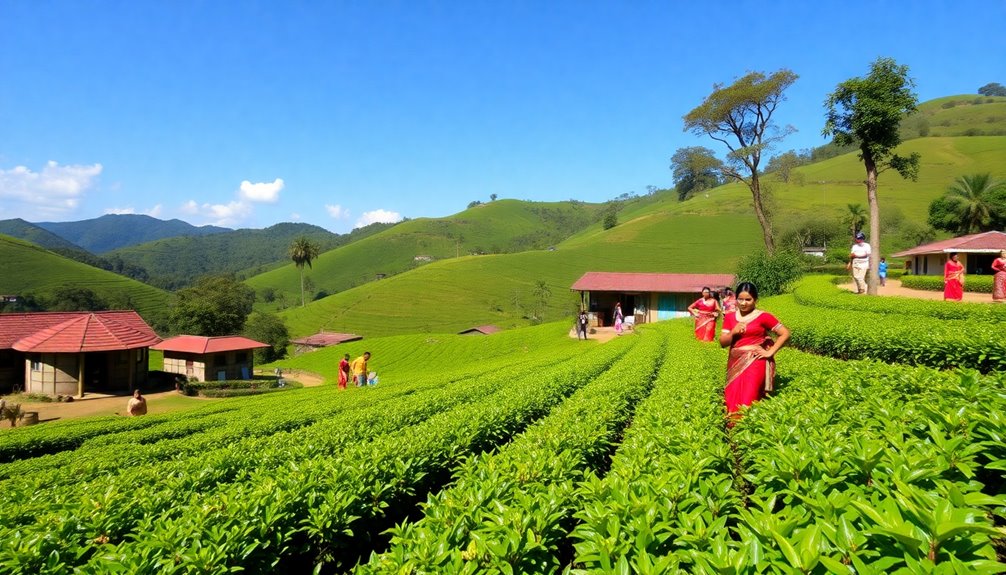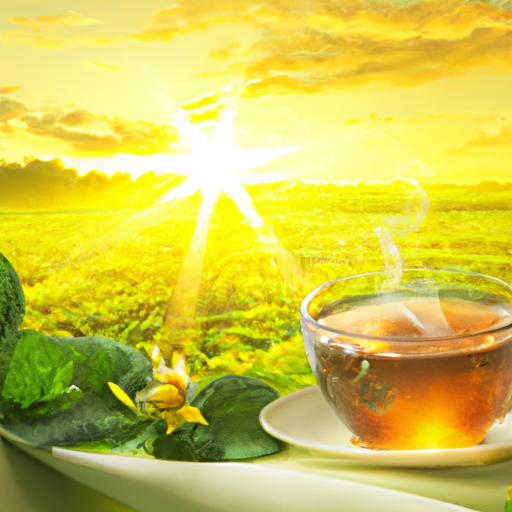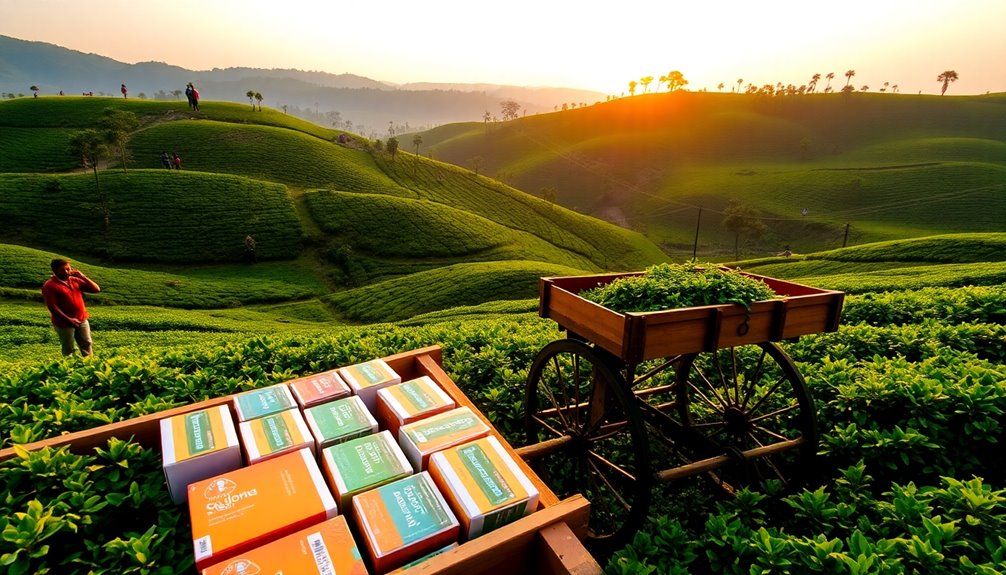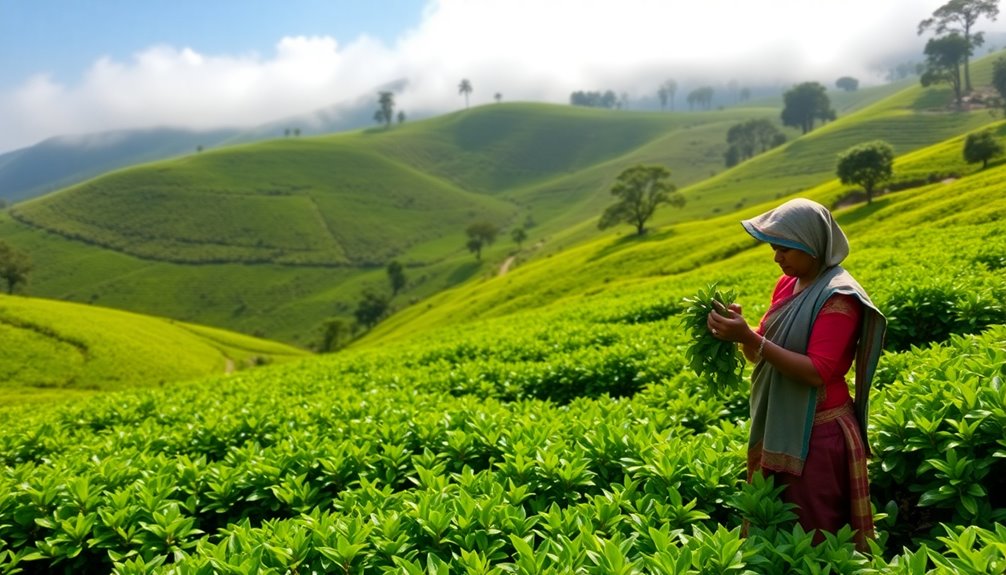Tea is super important in Sri Lanka's economy and culture! It helps bring folks together while boosting the nation's wealth. Here's why it matters:
- Contributes about 2% to the GDP.
- Gives jobs to over 215,000 people.
- Celebrated in fun festivals like the Nuwara Eliya Season.
- Ceylon tea is loved worldwide, making Sri Lanka a top exporter.
These connections make tea a special part of life in Sri Lanka, blending work and joy. So, grab a cup and discover more about how tea shapes this beautiful island!
Key Takeaways
- Tea contributes approximately 2% to Sri Lanka's GDP, generating over $1.3 billion in revenue in 2021, vital for the economy.
- The tea industry provides direct employment for over 215,000 individuals, supporting livelihoods for more than 10% of the population.
- Ceylon tea is a globally sought-after product, with 55% of exports going to Middle Eastern countries, enhancing Sri Lanka's export earnings.
- Cultural events like the Nuwara Eliya Season and traditional tea ceremonies celebrate Sri Lankan identity and foster community connections.
- Labor rights issues persist, with workers facing low wages and challenging conditions, driving the need for improved rights and living standards.
Introduction
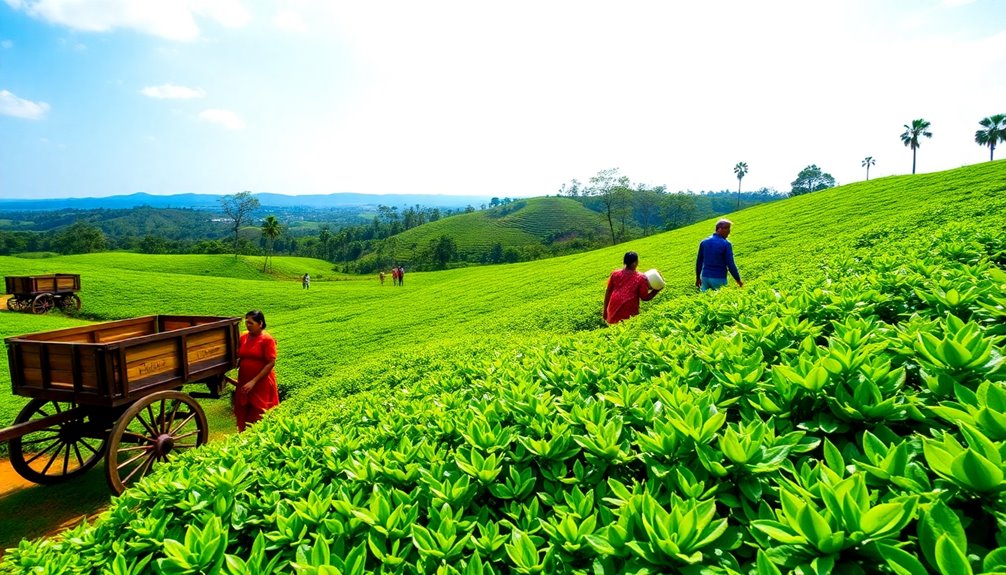
Understanding the profound impact of tea on Sri Lanka's economy and culture reveals its essential role in shaping the nation. Tea isn't just a drink; it's a part of life in Sri Lanka!
You might be surprised to learn that tea production contributes about 2% to the country's GDP, bringing in over $1.3 billion in 2021. That's a big deal!
Sri Lanka, known for its delicious Ceylon tea, is the fourth-largest tea producer globally. The tea industry focuses on high-quality orthodox black teas, which are loved around the world.
Here are some fun facts to consider:
- Ceylon tea adds to the country's cultural identity and traditions.
- The tea industry represents about 60% of food imports and provides 50% of agricultural export earnings.
This special beverage is vital to Sri Lanka's economy and helps families thrive. With over 1 million people connected to this industry, tea truly brings communities together.
Tea's Contribution to Employment
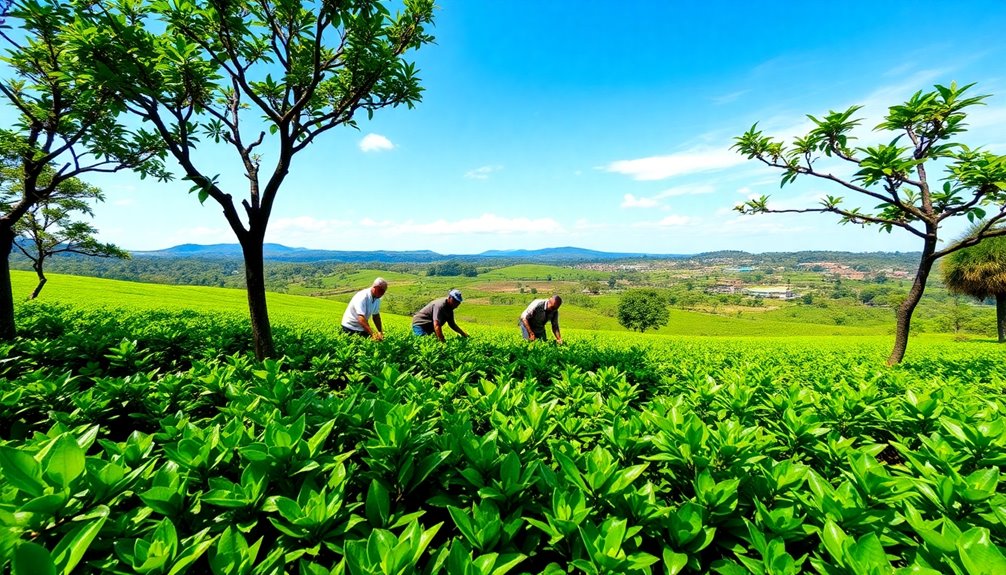
Employing over 215,000 individuals directly on tea plantations, the tea industry is a cornerstone of employment in Sri Lanka. This vibrant industry doesn't just support those working in the fields; it also uplifts over 1 million people indirectly! The Sri Lankan government recognizes how essential tea production is for the economy of Sri Lanka, as it provides livelihoods for more than 10% of the population.
However, being a tea picker can be challenging. Many workers earn as little as 64 rupees per day, which makes it tough to make ends meet. Despite these difficulties, the joy of working among the lush green tea plantations in Sri Lanka brings a sense of pride and community. Families often gather to help each other, sharing stories and laughter while they work.
The rich history of tea cultivation began with James Taylor in the 19th century, and since then, it has shaped not only employment patterns but also the lives of many Sri Lankans.
With each cup of tea enjoyed around the world, you can celebrate the hard work and dedication of these tea pickers who play a vital role in this enchanting industry!
Top Global Tea Exporter
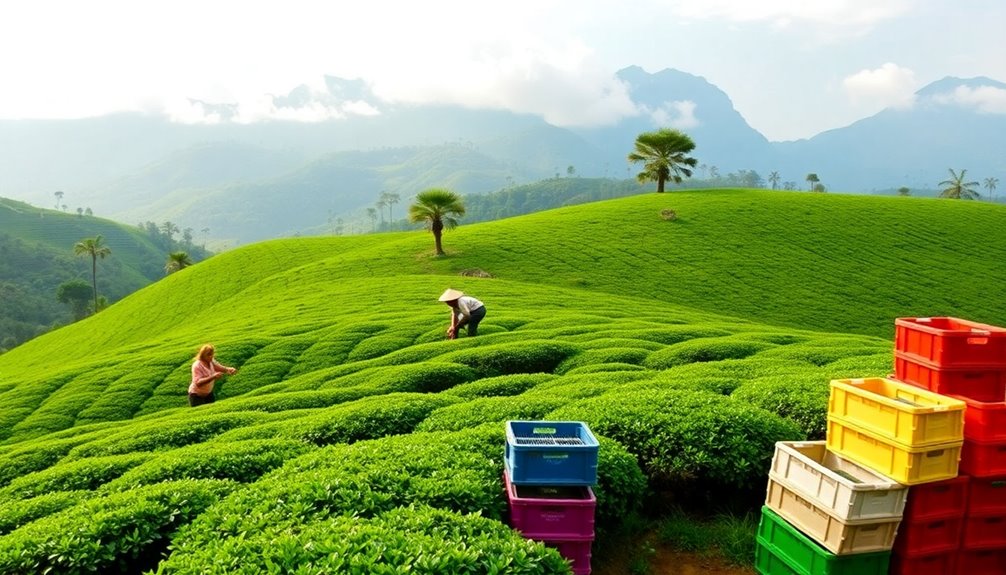
Sri Lanka stands proudly as one of the top global tea exporters, showcasing its rich heritage and commitment to quality. You might be surprised to learn that Lankan tea exports generated around $1.3 billion in 2021 alone! This remarkable achievement makes tea a major player in the economy of Sri Lanka, contributing to the country's total merchandise exports.
Ceylon tea, known for its delightful flavors and high quality, is highly sought after and commands top prices in global auctions. People all around the world enjoy it, especially in major export markets like the CIS countries, the UAE, Russia, and Turkey. In fact, 55% of Sri Lankan tea goes to Middle Eastern nations, making it a favorite there!
Moreover, the tea industry plays a vital role in providing employment to over 1 million individuals directly or indirectly. From tea pickers to factory workers, many Sri Lankans rely on this industry for their livelihoods.
Cultural Festivals Celebrating Tea

Tea's cultural significance in Sri Lanka shines through during vibrant festivals that celebrate its rich traditions and customs. One of the most exciting times is the Nuwara Eliya Season, where families and friends gather to enjoy the finest teas.
You'll see lively tea ceremonies that showcase local customs, bringing everyone together in a spirit of joy and hospitality.
These festivals often feature tastings of different tea blends, letting you explore the incredible variety of Sri Lankan tea culture. Imagine sipping a warm cup of tea with your loved ones, sharing stories, and laughing together!
Here are some highlights from these tea celebrations:
- Traditional Tea Ceremonies: Experience the art of preparing and serving tea, reflecting national identity and community bonding.
- Community Events: Join in on lively gatherings where tea is the star, fostering connections among people.
- Nuwara Eliya Season: Enjoy the breathtaking beauty of tea plantations, while indulging in the region's high-quality teas.
Through these joyful events, you'll see how deeply rooted tea is in the hearts of Sri Lankans, making every sip a taste of culture and tradition!
Labor Rights Issues
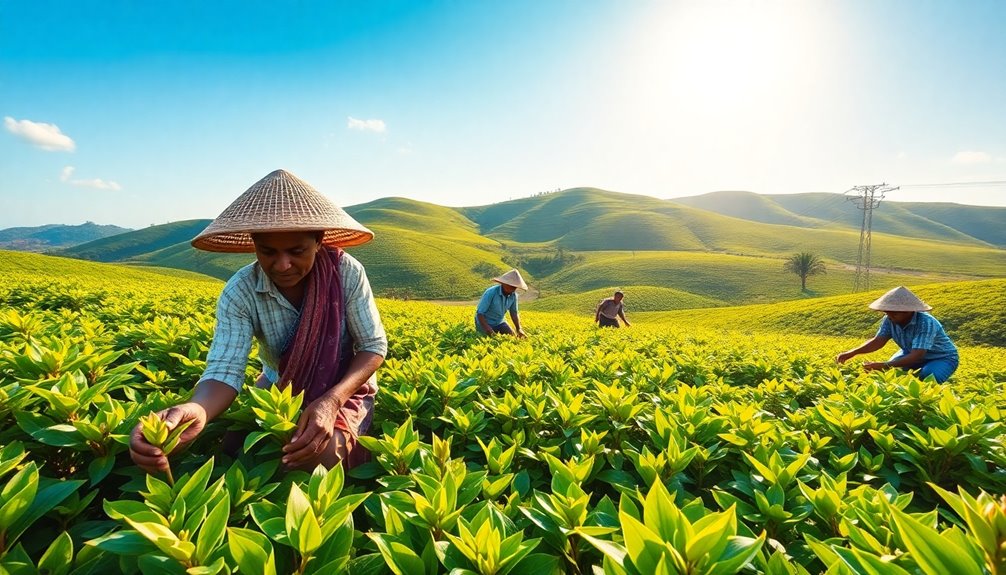
Labor rights issues in Sri Lanka's tea industry have reached a critical point, with many workers living on as little as 64 pence a day. Isn't that shocking?
These tea pickers, who help produce the lovely tea you enjoy, face tough labor conditions on tea plantations. They work long hours, often battling harsh weather, like heavy rains and leech infestations, which can make their jobs even harder.
The economic situation for these workers has worsened due to wage cuts and rising food prices. In 2021, when the government banned chemical fertilizers, tea producers saw their crops struggle, leaving workers with even less income.
Plus, fuel rationing means they wait in long lines for supplies, affecting their daily lives.
However, there's a glimmer of hope! The government is aware of these issues and is exploring ways to improve labor conditions for tea workers.
With a little help and attention, these hardworking individuals can enjoy better lives while continuing to share Sri Lanka's wonderful tea with the world.
Let's keep cheering for them and support their journey towards better rights and living conditions!
Practical Applications
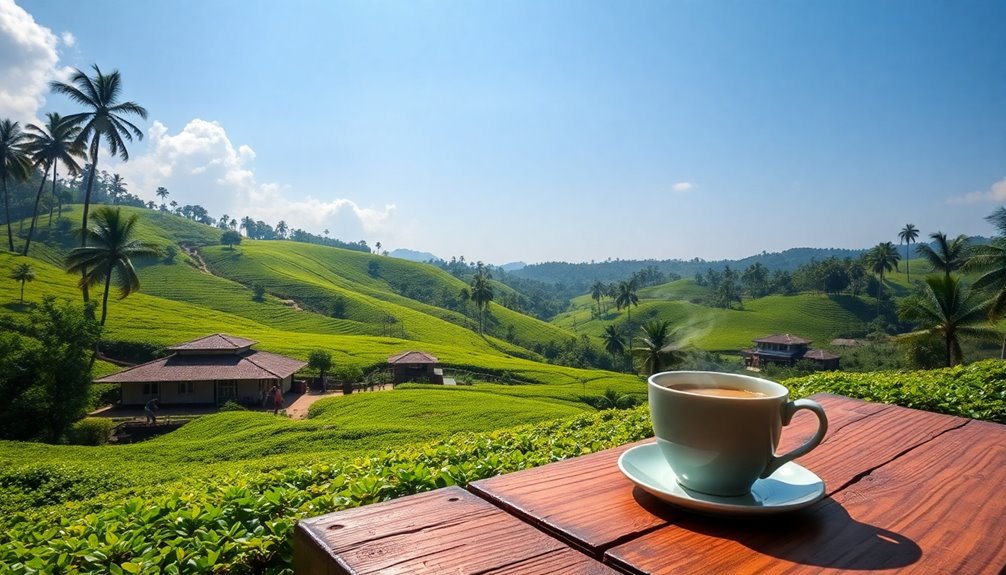
Improving labor rights in the tea industry can have significant practical applications that benefit both workers and the economy. When you support fair treatment for workers on Tea Estates, you're helping over 215,000 individuals and their families.
These families aren't just part of the workforce; they represent more than a million people who rely on Sri Lanka's tea for their livelihoods.
Here are some wonderful benefits of improved labor rights:
- Better Working Conditions: Workers can feel safer and happier, leading to better tea quality. This means even more people will enjoy Sri Lanka's famous Ceylon tea.
- Boost to the Economy: With tea accounting for 2% of the country's economy, happy workers produce better tea, increasing profits and exports. That's good for everyone!
- Cultural Enrichment: When you support workers, you're also helping maintain the traditions linked to tea. Festivals and family gatherings will continue to thrive, celebrating the joy of Sri Lanka's tea culture.
With the Lion Logo proudly marking genuine Ceylon tea, you can sip on a cup, knowing you're supporting both the people and the beauty of Sri Lanka!
Frequently Asked Questions
Why Is Tea so Important in Sri Lanka?
Tea's important in Sri Lanka because it reflects the nation's identity, embodies hospitality, and connects people. You'll find it in daily life, cultural ceremonies, and social gatherings, making it a cherished symbol of community and tradition.
Why Is Tea Important to the Economy?
Tea's crucial to the economy because it generates significant export revenue and creates jobs for thousands. When you consider its impact on GDP and employment, it's clear why tea's importance can't be underestimated.
What Is the Performance of Tea Industry in Sri Lanka?
You'll find that the Sri Lankan tea industry shows notable performance, contributing significantly to GDP and employing hundreds of thousands. Despite challenges like climate change, it continues to modernize and adapt, ensuring its ongoing relevance.
Is Tea a Big Business in Sri Lanka?
Yes, tea's a big business in Sri Lanka. It generates significant revenue, supports countless jobs, and plays a vital role in the economy. You'll see its impact in exports and local livelihoods everywhere.
Conclusion
In conclusion, tea plays a big part in Sri Lanka's heart and economy! It brings jobs to many people, and the country shines as a top tea exporter. Plus, you can enjoy wonderful festivals that celebrate this special drink. While there are important labor rights issues to think about, the joy of tea unites families and friends. So, next time you sip a cup, remember the beautiful culture and stories behind it! Cheers to tea!

